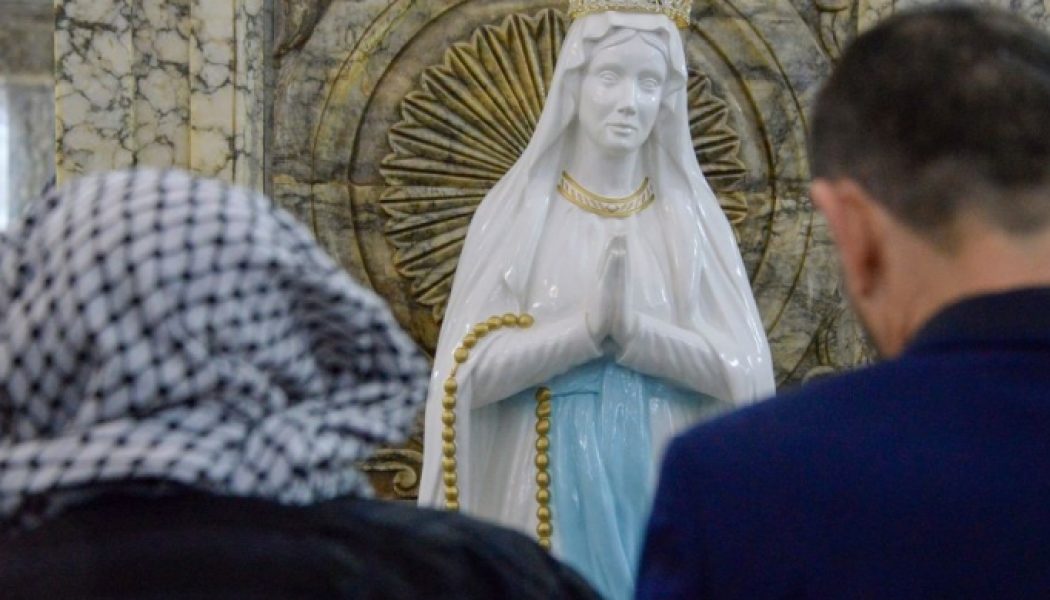
Iraqi Christians attend Christmas Eve Mass at the Syriac Catholic Church of the Immaculate Conception in the predominantly Iraqi Christian town of Qaraqosh, in Nineveh province some 30 kilometers (18.6 miles) from Mosul, on Dec. 24, 2019. The 2020 ‘World Watch List’ report found that 87% of Christians have left Iraq since 2003. (Zaid Al-Obeidi/AFP via Getty Images)
The 2020 ‘World Watch List’ on the persecution of Christians highlights an unprecedented level of persecution against Christians.
ROME — The 2020 “World Watch List,” published by international religious freedom advocate Open Doors, confirms the unprecedented level of persecution against Christians around the world — a persecution that appears even worse than what the Church experienced in the first few centuries of its existence.
Presented by Open Doors’ Italian bureau during a Jan. 15 news conference at the Chamber of Deputies in Rome, the annual report focuses on the 50 countries where the Christians are most likely to be persecuted. Referring to the period between Nov. 1, 2018, and Oct. 31, 2019, the research was conducted in about 100 countries that can be linked to increased persecution.
The World Watch List (WWL) concluded that 260 million Christians — from all denominations — were faced with persecution last year (an increase of 15 million from the 2019 WWL, which reported 245 million persecuted Christians). The 2020 WWL noted that one of every eight Christians in the countries targeted by the study experiences a high level of persecution because of his faith.
The report defines persecution as any kind of violence, from murder to daily pressure to intimidations and discrimination motivated by a hatred of the Christian faith.
Even though the number of Christians killed decreased from 4,305 in 2018 to 2,983 in 2019, as the 2020 World Watch List latest figures reveal, anti-Christian violence has generally intensified, especially in Asia and Africa. Furthermore, the number of churches attacked or closed has dramatically increased, from 1,847 to 9,488 (with more than 5,500 of these actions taking place in China).
“It is an absolute fact that the dimension and intensity of the persecution has been increasing every year, especially over the past decade,” Cristian Nani, director of Porte Aperte/Open Doors Italy, told the Register, noting that six years ago, there was only one country (North Korea) in which Christians experienced extreme persecution, whereas there are 11 countries (North Korea, Afghanistan, Somalia, Libya, Pakistan, Eritrea, Sudan, Yemen, Iran, India and Syria) that fit this description in the 2020 WWL.
Open Doors was founded in 1955 by Brother Andrew van der Bijl, a nondenominational Christian missionary, with the aim of helping discriminated Christians in communist Eastern Europe — notably by smuggling Bibles to local inhabitants — which thereby earned him the nickname “God’s Smuggler.” Open Doors has through the years grown to become a worldwide mission, giving support to Christians anywhere they suffer persecutions.
New Challenges
Open Doors enlarged and diversified its scope of action in the 1980s, in the face of the rise of other threats against Christians, such as the expansion of violence against Christians in Muslim-majority countries. It also started launching initiatives in China, such as night operations beginning in 1981, during which Open Doors missionaries landed 1 million contraband Chinese Bibles under cover of darkness on a beach in south China. From there, they were to be distributed to Christians throughout the country.
“Persecution has taken different forms and raged in different regions and territory over time,” Nani said, noting that one of the 2020 report’s main highlights is the diffusion of violence in Sub-Saharan Africa, including Burkina Faso, Nigeria, Niger, Cameroun and Chad — all of which are still predominantly Christian zones. Islamic groups in these regions have committed the violence in their efforts to eliminate the region’s Christian presence.
Another important dynamic to emerge from the 2020 WWL is the growing persecution in south and southeastern regions of Asia. In particular, the bloody attack in Sri Lanka during Easter celebrations in April 2019 is still very present in everyone’s mind.
“We estimate that one Christian in two and a half suffers a form of persecution in Asia,” Nani said. “Another thing that is interesting, alas, is the serious risk that persecution becomes digital in countries like China or India, through state surveillance.”
The religious activities are being monitored through such methods as biometry, artificial intelligence and facial recognition. As Nani points out, some churches are forced to install closed-circuit cameras, with which the government can monitor church members’ activities through facial recognition.
“There is no liberty in these countries, and the use of technological measures by the state definitely makes things worse,” Nani said.
Sexual Violence
While relatively underreported due to lack of reliable data, mass sexual violence against women is a practice to which more and more anti-Christian terrorists resort to undermine entire communities. The WWL reports the alarming figure of 8,537 worldwide cases of sexual assaults against Christians (23 per day), which doesn’t include forced marriages, which numbered about 630.
However, the researchers consider that these figures are conservative estimates, as most incidents of sexual violence occur privately, behind the closed doors of a perpetrator’s household. In this light, Open Doors has been developing more efficient tools of research to better determine the number and kind of sexual violence incidents as a form of persecution. The organization plans to publish an ad hoc report on these findings by the end of February.
In Nani’s view, sexual violence against Christians — which he notes is either unknown or underestimated in academic circles — will be widely discussed in the coming years. “This growing practice weakens a lot of churches, especially in Africa, but it is spreading elsewhere, in Pakistan or India, for instance,” he said, mentioning jihadist groups or other local groups like the Fula, a predominantly Muslim nomadic people in northern Nigeria who use this strategy as a weapon against Christians.
“It is a particularly efficient weapon,” Nani told the Register, “as it leaves a deep and everlasting wound in women’s souls, and it necessarily destabilizes their whole family; it is a real tragedy for a community.”
The Disappearing Christians
Despite the defeat of the Islamic State (ISIS) in Levant, the Christian exodus from the Middle East is continuing in catastrophic proportions. Indeed, the report highlights that 87% of Christians left Iraq since 2003, and Syria lost 66% of its Christian community since the beginning of the civil war, in 2011.
Seen as a scourge in the region, this disappearance of the Middle East’s pioneers of the Christian faith, especially in Syria and Iraq, was addressed by pastor George Moushi during the Jan. 15 news conference in Rome. An evangelical Christian from the northeastern Syrian city of Qamishli, Moushi was kidnapped by the Kurds a few months ago for having launched a project to build a new church in the city.
Moushi said that his ordeal, during which he was held by his captives for a few hours before being released, has not discouraged him. He said he refuses to leave his country and wants to continue bearing witness every day in the birthplace of Christianity, trying to serve and give support to his brothers and sisters in faith.
“Given the huge pressure, the pain and extreme poverty, running away often seems the best option for us Christians, and so many did leave in the past few years,” Moushi told the Register. But, he added, it is inconceivable that “Christians, the salt of the Middle East, have to leave the lands where they first sowed the seeds of Christendom.”
“By making the choice to stay and face all the risks involved,” Moushi also said, “I want to send Christians the message that they should not be afraid to stay, and I also want to encourage our brothers abroad to help us.”
Beside financial support and prayer, Moushi said, the West should also seek to actively promote Christians’ religious freedom in the region by encouraging a shift in policies among the governments in the Middle East.
Political Pressure
This strategy of applying such political pressure to address Christian prosecution is gaining ground in some Western countries. In Italy, for instance, after the publication of the 2019 WWL, an interparliamentary group was founded to protect the religious freedom of Christians around the world.
The initiative was led by Andrea Delmastro delle Vedove, a member of the Italian political party Brothers of Italy. According to delle Vedove, who also spoke at the Jan. 15 news conference in Rome, he was inspired to follow the path of Hungarian Prime Minister Viktor Orbán, who opened an ad hoc fund called “Hungary Helps” in 2016 dedicated to the same cause.
“There are very concrete ways to motivate governments to protect their Christians minorities, but it requires political courage,” delle Vedove told the Register, noting that two months ago, the newly formed interparliamentary group opposed signing a bilateral cooperation agreement on human rights with Qatar, as it could be interpreted as condoning the religious-freedom policies of a nation that is among Open Doors’ 50 worst countries for religious persecution.
In the same way, the Italian deputy denounced China’s 2013 global development proposal, the “Belt and Road Initiative,” which seeks to improve trade through Chinese-controlled infrastructure programs between China and Christian-majority Western countries.
“If we agree to this new Silk Road,” delle Vedove said, “while pretending not to know that, in this past year, 5,000 Christian churches were closed or destroyed in China, [it] means that we subordinate some alleged — and not yet proved — economic advantages to the most intimate and precious right: religious freedom.”
In delle Vedove’s view, one of the first political measures to take in Europe would be to stop giving money to the Italian humanitarian nongovernmental organization International Cooperation, which operates in a number of countries that heavily persecute Christians, unless the investments are subordinated to the promotion of the religious rights of Christians in the world.
But the interparliamentary group is also taking some positive steps of its own. Since its creation a year ago, the group allocated a fund of 2 million euros to Syrian Christians for the rebuilding of their cities destroyed by civil war. The fund will also be used to help advocate for Christians who wish to return to their homes, to repopulate Iraq’s Nineveh Plain or the Syrian city of Maaloula, where Aramaic was still spoken until Christians fled after the arrival of ISIS in 2013.
Awareness Grows
Perhaps because the catastrophic dimension of anti-Christian persecution in the world does not spare Europe, which has been the scene of an unprecedented wave of attacks against Christian houses of worship in 2019, there has been growing public attention and media coverage of such persecution. This new light on an old problem has become a source of hope for the defenders of the Christian cause.
According to Cristian Nani, a significant change occurred in the media world over the past few years, and sensitivity to this topic is developing.
“When I started reporting on the persecution of Christians,” he said, “it was very difficult to mention this simple word in the media, as they didn’t even agree on the definition.”
The fact that the 2020 WWL was presented at the Chamber of Deputies, Nani said, shows that the West is growing more aware of the situation of Christians in the different countries. In addition, Nani is encouraged that Open Doors now has offices in more and more decision-making places than it did in the past, including the European Parliament. He added, however, that the organization is still trying to provide a presence at the U.N.
“The situation of Christians, especially in the Middle East, challenges the consciences of all Westerners, as Christianity was born there, far before Muhammad’s first breath,” delle Vedove said, adding that all of Western culture is based, practically and symbolically, on the historic truth of Christ’s coming to earth and establishing his Church for all people. “We cannot accept a world that is no longer capable of defending our brothers in Christ, all the more since countries in the Middle East need Christianity to be pacified.”
Solène Tadié is the Register’s Rome-based Europe correspondent.







